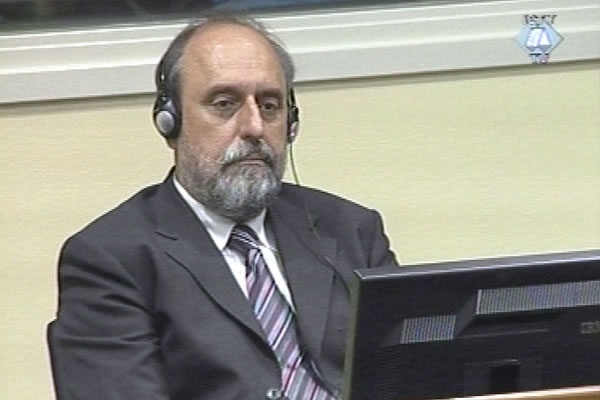Home
HADZIC CASE: TRIAL CHAMBER TOLD TO CORRECT ERRORS
The Appeals Chamber has quashed the Trial Chamber’s decision to deny the prosecution’s motion for the urgent resumption of Goran Hadzic’s trial. The Trial Chamber has been ordered to correct the errors in the reversed decision and reassess if the accused is fit to stand trial. Based on that reassessment the Trial Chamber should decide whether to continue or terminate the proceedings
 Goran Hadzic in the courtroom
Goran Hadzic in the courtroom In its decision of 26 October 2015 the Trial Chamber denied the prosecution’s motion to proceed with the trial. Today the Tribunal’s Appeals Chamber ruled that in its decision the Trial Chamber committed a series of ‘discernible errors’. The Appeals Chamber thus granted the prosecution’s motion.
Although the controversial decision has been quashed, an order to resume the proceedings hasn’t been issued. Instead, the case was referred back to the Trial Chamber to reassess if Hadzic is fit to stand trial given the medical documents the Trial Chamber has been receiving since October 2015. If the Trial Chamber concludes that the accused is able to attend the trial, the judges will then have to consider all reasonably available modalities for continuing of the proceedings under the ‘proportionality principle’. This standard has been ignored in the decision the Appeals Chamber has reversed.
According to this principle, when deliberating on whether the right of the accused to attend trial would be partially restricted, the judges should take care to impair that right no more than necessary to accomplish the objective of a fair and expeditious completion of the proceedings.
The Appeals Chamber wants to avoid any further adjournments in the hope that Hadzic’s health might improve. The Trial Chamber has also been ordered to correct the errors in the quashed decision and to decide ‘preferably not later than 25 March 2016' whether to continue or terminate the proceedings against Goran Hadzic.
In 2004, Goran Hadzic was indicted for crimes against non-Serbs in Eastern Slavonia and the Republic of Serb Krajina. Hadzic served as the prime minister and later as the president of the self-proclaimed Serb entities. Hadzic was the last fugitive to be arrested on a warrant issued by the Tribunal in 2001. His trial began in October 2012; the prosecution rested its case in October 2013 but the trial was suspended in October 2014, just two or three months before the defense was to rest its case. Hadzic, diagnosed with an incurable brain tumor, refuses to waive his right to attend his trial. On the other hand, the Trial Chamber rejected the prosecution’s proposal to make Hadzic participate in the proceedings via video link or other way which would make it possible to complete to trial as quickly as possible. To that purpose, the prosecution proposed to waive its right to cross-examine the remaining defense witnesses.
In its decision, the Appeals Chamber notes that the right to be physically present at trial is not absolute and could be revoked if the accused continues with disruptive behavior. The Appeals Chamber invokes the case of Jovica Stanisic, who had refused to enter the courtroom or to follow the trial via video link from the detention unit. The judges stressthat the disruption of the trial does not have to be either physical or deliberate in order for the chamber to impose restrictions on the right of the accused to attend the trial, with a view to ensuring a fair and expeditious completion of the proceedings.
Linked Reports
- Case : Hadzic
- 2015-12-03 PROSECUTION: HADZIC’S TRIAL SHOULD GO ON
- 2015-11-03 PROSECUTOR SEEKS PERMISSION TO APPEAL AGAINST STAY OF PROCEEDINGS IN HADZIC CASE
- 2015-10-26 GORAN HADZIC’S TRIAL SUSPENDED FOR THREE MONTHS
- 2016-04-06 "INDEFINITE STAY" OF HADZIC’S TRIAL
- 2016-05-20 PROSECUTION CALLS FOR FORMAL END TO HADZIC TRIAL
- 2016-07-13 VICTIMS WILL NOT HEAR JUDGMENT IN HADZIC CASE
